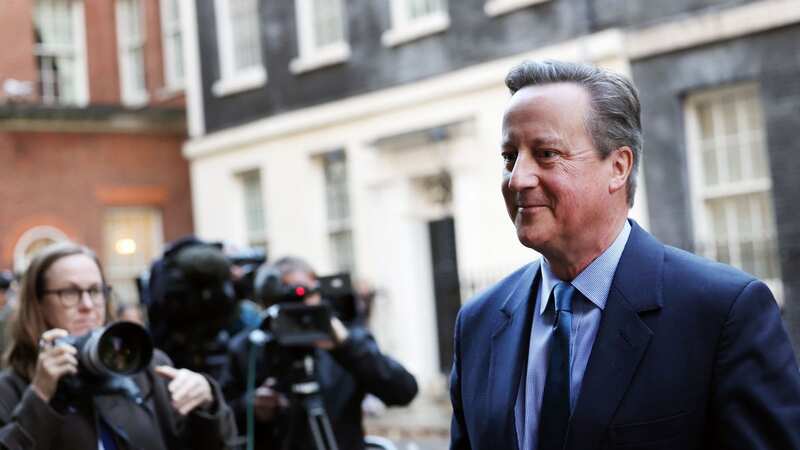'Drafting in Cameron is unlikely to save Rishi Sunak's party from insolvency'

Seven years ago, David Cameron left Downing Street for the political wilderness. He had gambled his career on Brexit and lost.
The country lost too. The man who had promised stability and strong government had lit the touch paper on a political bomb whose explosion caused an unprecedented era of chaos.
As Britain tore itself apart over Europe and the Tories lurched from one failed leader to another, David Cameron retreated to his £25,000 shepherd’s hut to write his memoirs and dabble in dubious lobbying practices. Now he has been called back to Westminster to rescue Rishi Sunak’s floundering premiership. The Prime Minister has turned to Lord Cameron in the hope he still has a hot line to Middle England.
In the 1990s Cameron and George Osborne set about detoxifying the ‘nasty party’ to make it more palatable to voters. Along the way they hugged hoodies, embraced green causes and fed dog treats to huskies. It was enough to help Cameron squeak into No 10, with the help of the Lib Dems, in 2010 and win outright in 2015.
The former Prime Minister is coming back as Foreign Secretary but his role will be to be act as a management consultant to a chief executive whose firm is haemorraghing customers. Sunak’s survival rests on winning back the moderate Conservative voters in the Tory shires and suburbs who have deserted the party for Labour and the Lib Dems.
 Teachers, civil servants and train drivers walk out in biggest strike in decade
Teachers, civil servants and train drivers walk out in biggest strike in decade
Cameron’s appointment is an acknowledgment that flirtation with Trump-style populism, personified by Suella Braverman, is over and a sign that a desperate Sunak is trying to pivot his party back towards the centre ground. Some Tory MPs fear this marks the abandonment of attempts to maintain the fragile alliance of Shire Tories and Red Wall voters cynically cobbled together by Boris Johnson.
Others have questioned how Sunak can present himself as the “change candidate” at the next election when he is having to bring the Conservative old guard out of retirement. In his conference speech last month the Prime Minister railed against the 30-year status quo that had failed Britain. Now he is putting his fate in the hands of an old-Etonian, Oxford-educated establishment figure who will probably be known as Lord Cameron of Bullingdon.
Nor is it a vote of confidence in the talent on the Conservative benches that Sunak has had to ennoble Cameron in order to fill what is one of the biggest jobs in Cabinet. The portly, puff-faced Cameron of 2023 may no longer have the appeal of the energetic, pink-faced Cameron who ran for office in 2010.
Most prime ministers see their reputations enhanced after leaving office. David Cameron’s standing has diminished since his departure. Among some voters he will always be associated with the austerity which tore the threads from the safety net of social security and left public services on their knees.
For others he will always be regarded as the person who inflicted the divisive EU referendum on this country and then did a bunk rather than clear up a mess of his own making. So many of the problems which plague the country today, from the crisis in social care, the record NHS waiting lists, to the dire shortage of housing can be traced back to Cameron’s time in Downing Street between 2010 and 2016.
It was not just on domestic issues that Cameron’s judgement has been questioned. The new Foreign Secretary has a mixed record when it comes to foreign affairs. The military action against Libya left the country in disarray. Britain’s reputation on the world stage has been dented by Brexit. His attempt to usher in a “golden age” of British-Chinese relations looks at best naive and at a worst a serious misjudgement in the wake of China’s increasing flexing of its muscles on the world stage.
Those who regarded Cameron as the consummate political salesman have revisited their opinion since the Greensill scandal which saw him tout business for the failed company like a spiv selling second hand watches on a dodgy market stall. The Serious Fraud Office is still investigating the financing of Greensill Capital which reportedly paid Cameron £720,000 a year before its collapse.
Labour will want to remind voters of this at every opportunity. But Cameron could also find himself under attack from the Tory right who will resent seeing a champion of Remain and a supporter of the European Court of Human Rights back round the Cabinet table. Since Cameron left office the Tories have tried the managerialism of Theresa May, flirted with Boris Johnson’s populism and then suffered first-degree burns after putting the economic pyromaniac Liz Truss in No 10.
Sunak, like an undecided shopper, has tried all these outfits before deciding to try Cameron’s tailor. This is the last gasp by a Prime Minister who prepares for an election at the head of a divided party uncertain of where it wants to go or what it believes in. Drafting in Cameron is unlikely to save his party from insolvency.
Read more similar news:
Comments:
comments powered by Disqus

































